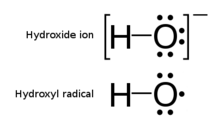How can OH radicals eradicate Virues and Bacteria ?
1 Answer
By damaging their DNA.
Explanation:
Reactive oxygen species, mainly the hydroxyl (OH) radicals, are toxic to cells and can lead to cell death. A hydroxyl radical has an unpaired electron in its outer shell and is looking for an other electron to pair with. Therefore it is a very reactive molecule, it 'steals' electrons from other molecules leaving them 'damaged'.

In a cell, bacterium or in a virus, the DNA is an important target of these radicals. When radicals react with DNA, it causes breaks in the DNA strands. When a lot of radicals are present, DNA damage can be so extensive that it can't be repaired or not correctly. Ultimately, the bacterium or virus will lose it's ability to replicate and they will die.
There are also other ways in which radicals cause damage. They can, for example, 'steal' an electron from lipids in the membrane of cells. This compromises the integrity of the protective outer layer of the cell and can also be a cause of cell death.

